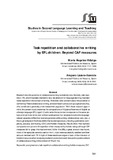Mostrar el registro sencillo del ítem
Task repetition and collaborative writing by EFL children: beyond CAF measures
| dc.creator | Hidalgo Gordo, María Ángeles | es_ES |
| dc.creator | Lázaro Ibarrola, Amparo | es_ES |
| dc.date.accessioned | 2021-06-23T06:38:04Z | |
| dc.date.available | 2021-06-23T06:38:04Z | |
| dc.date.issued | 2020 | |
| dc.identifier.issn | 2083-5205 | |
| dc.identifier.uri | https://hdl.handle.net/2454/40013 | |
| dc.description.abstract | Research into the potential of collaborative writing is relatively new. Similarly, task repetition (TR), which has been claimed to be a valuable tool for language learning, has been rarely explored in the context of writing. Therefore, little is known about the potential of combining TR and collaborative writing, and even less if we focus on young learners (YLs), who constitute a generally under-researched population. With these research gaps in mind, the present study examines the compositions of 10 pairs of learners of English as a foreign language (EFL) (aged 12) who write the same text in response to the same picture prompt three times over a three-week period. Our analysis includes the language-related episodes (LREs) that learners generate while writing collaboratively and, also, a thorough analysis of the three drafts that students produce, including quantitative (com-plexity, accuracy and fluency (CAF)) and holistic measures. Results show that learners' compositions improve with repetition when measured by holistic ratings although CAF measures fail to grasp this improvement. As for the LREs, a great amount was found, most of the episodes were focused on form, most were successfully resolved and their amount declined with TR. In light of these results we argue in favor of the inclusion of holistic measures when analyzing students' productions and discuss the positive effects of collaborative writing in the context of TR with YLs. | en |
| dc.description.sponsorship | This work was supported by grants FFI2016-74950-P (Spanish Ministry of Economy and Competitiveness, National Research Agency and European Regional Development Fund-AEI/FEDER/EU) and IT904-16 (Basque Government). | |
| dc.format.extent | 22 p. | |
| dc.format.mimetype | application/pdf | en |
| dc.language.iso | eng | en |
| dc.publisher | Adam Mickiewicz University Press | |
| dc.relation.ispartof | Studies in Second Language Learning and Teaching, 10 (3), 501-522 | |
| dc.rights | This work is licensed under a Creative Commons Attribution 4.0 International License. | en |
| dc.rights.uri | http://creativecommons.org/licenses/by/4.0/ | |
| dc.subject | CAF | en |
| dc.subject | Collaborative writing | en |
| dc.subject | Holistic measures | en |
| dc.subject | Task repetition | en |
| dc.subject | Young learners | en |
| dc.title | Task repetition and collaborative writing by EFL children: beyond CAF measures | en |
| dc.type | info:eu-repo/semantics/article | en |
| dc.type | Artículo / Artikulua | es |
| dc.contributor.department | Ciencias Humanas y de la Educación | es_ES |
| dc.contributor.department | Giza eta Hezkuntza Zientziak | eu |
| dc.rights.accessRights | info:eu-repo/semantics/openAccess | en |
| dc.rights.accessRights | Acceso abierto / Sarbide irekia | es |
| dc.identifier.doi | 10.14746/ssllt.2020.10.3.5 | |
| dc.relation.projectID | info:eu-repo/grantAgreement/MINECO/Plan Estatal de Investigación Científica y Técnica y de Innovación 2013-2016/FFI2016-74950-P | en |
| dc.relation.publisherversion | https://doi.org/10.14746/ssllt.2020.10.3.5 | |
| dc.type.version | info:eu-repo/semantics/publishedVersion | en |
| dc.type.version | Versión publicada / Argitaratu den bertsioa | es |



